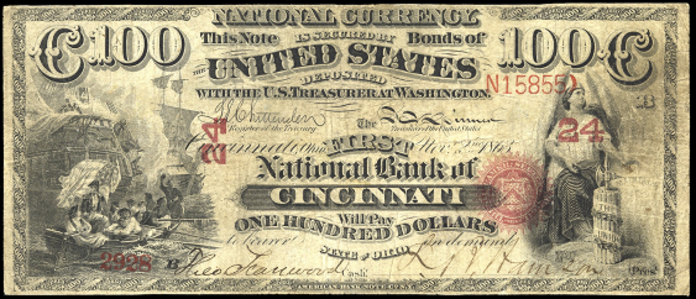One Hundred Dollar Notes › Nationals › 1863 One Hundred Dollar Original Series National Bank Notes › New York Charters › 1863 $100 Syracuse New York Second National Bank
Get Value Now
| Item | Info |
|---|---|
| Series | 1863 |
| Charter | #140 Second National Bank of Syracuse, New York |
| Year Chartered | 1863, 179 Banks Chartered |
| City Info | Syracuse is a city in, and the county seat of, Onondaga County, New York, in the United States. It is the largest U.S. city with the name "Syracuse", and is the fifth most populous city in the state of New York following New York City, Buffalo, Rochester, and Yonkers. At the 2010 census, the city population was 145,170, and its metropolitan area had a population of 662,577. It is the economic and educational hub of Central New York, a region with over a million inhabitants. Syracuse is also well-provided with convention sites, with a downtown convention complex. Syracuse was named after the original Greek city Syracuse, a city on the eastern coast of the Italian island of Sicily. Source: Wikipedia |
| Similar Cities | If your note doesn't match try: 1. Syracuse, New York - First National Bank 2. Syracuse, New York - Third National Bank |
| Seal Varieties | Red with rays |
| See Also | If your note doesn't match try: 1. 1863 $100 Compound Interest Treasury Note 2. 1864 $100 Compound Interest Treasury Note 3. 1863 $100 Gold Certificate 4. 1861 $100 Interest Bearing Note 5. 1863 $100 Interest Bearing Note 6. 1864 $100 Interest Bearing Note |
| Other Info | 1. Value depends on notes known for charter, condition and market demand. |
| Neat Fact | Notes from common charters are less valuable compared to rarer charters. Value also depends on type, denomination and total notes known for city, state and region. Ultimate determination of value is collector demand. |
No Obligations Offers and Appraisals
Please submit a good photo or scan. It will be identified and evaluated. Understand there may be subtle differences between the image you see above and your note. Signatures, design, markings and note condition will determine the offer price. Notes in Uncirculated or better condition receive the best offers.
Appraisals can be estimated for wholesale and retail prices. Wholesale is what dealers typically pay. Retail is what a collector might pay. Retail is slightly higher in most cases.
Please visit this page for USA Paper Money Reference. Do not treat this page as a reference guide, it is for appraisal and acquisition purposes only.
